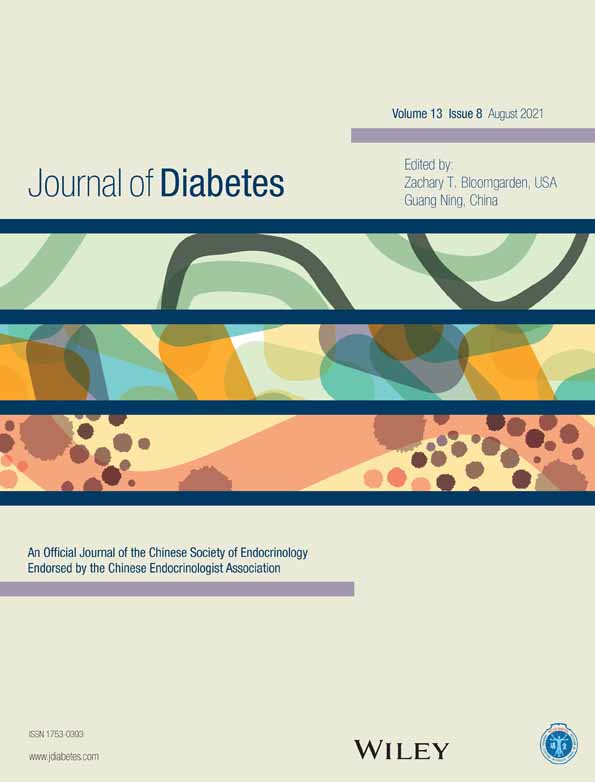Diabetic ketoacidosis drives COVID-19 related hospitalizations in children with type 1 diabetes
糖尿病酮症酸中毒促使1型糖尿病儿童发生新型冠状病毒肺炎相关住院治疗
Funding information: Abbott Diabetes; Dexcom; Eli Lilly and Company; Insulet Corporation; JDRF; Leona M. and Harry B. Helmsley Charitable Trust; Medtronic; Tandem Diabetes Care
Abstract
enBackground
Diabetes is a risk factor for poor COVID-19 outcomes, but pediatric patients with type 1 diabetes are poorly represented in current studies.
Methods
T1D Exchange coordinated a US type 1 diabetes COVID-19 registry. Forty-six diabetes centers submitted pediatric cases for patients with laboratory confirmed COVID-19. Associations between clinical factors and hospitalization were tested with Fisher's Exact Test. Logistic regression was used to calculate odds ratios for hospitalization.
Results
Data from 266 patients with previously established type 1 diabetes aged <19 years with COVID-19 were reported. Diabetic ketoacidosis (DKA) was the most common adverse outcome (n = 44, 72% of hospitalized patients). There were four hospitalizations for severe hypoglycemia, three hospitalizations requiring respiratory support (one of whom was intubated and mechanically ventilated), one case of multisystem inflammatory syndrome in children, and 10 patients who were hospitalized for reasons unrelated to COVID-19 or diabetes. Hospitalized patients (n = 61) were more likely than nonhospitalized patients (n = 205) to have minority race/ethnicity (67% vs 39%, P < 0.001), public insurance (64% vs 41%, P < 0.001), higher A1c (11% [97 mmol/mol] vs 8.2% [66 mmol/mol], P < 0.001), and lower insulin pump and lower continuous glucose monitoring use (26% vs 54%, P < 0.001; 39% vs 75%, P < 0.001). Age and gender were not associated with risk of hospitalization. Higher A1c was significantly associated with hospitalization, with an odds ratio of 1.56 (1.34-1.84) after adjusting for age, gender, insurance, and race/ethnicity.
Conclusions
Higher A1c remained the only predictor for hospitalization with COVID-19. Diabetic ketoacidosis is the primary concern among this group.
摘要
zh背景
糖尿病是新型冠状病毒肺炎预后差的危险因素, 但在目前的研究中, 1型糖尿病儿童患者的情况鲜有报道。
方法
T1D交流处协调了一个美国新型冠状病毒肺炎1型糖尿病的临床注册研究。46个糖尿病中心提交了实验室确认的新型冠状病毒肺炎患者的儿童病例。采用Fisher‘s 确切检验分析临床因素与住院时间的相关性。用Logistic回归计算住院的优势比。
结果
报道了266例既往确诊的<19岁的1型糖尿病患者患有新型冠状病毒肺炎的资料。糖尿病酮症酸中毒(DKA)是最常见的不良结局(n=44, 72%的住院患者)。因严重低血糖住院4例, 需要呼吸支持住院3例(其中1例经气管插管机械通气), 1例儿童多系统炎症综合征, 10例因与新型冠状病毒肺炎或糖尿病无关的原因住院。住院患者(n=61)与非住院患者(n=205)相比:少数族裔占比更高(67%比39%, P<0.001)、公共保险覆盖率更高(64%比41%, P<0.001)、糖化血红蛋白更高(11%[97 mmol/mol]比8.2%[66 mmol/mol], P<0.001)、胰岛素泵以及连续血糖监测系统使用率更低(26%比54%, P<0.001, 39%比75%, P<0.001)。年龄和性别与住院风险无关。较高的糖化血红蛋白与住院显著相关, 在校正了年龄、性别、保险和种族后, 优势比为1.56(1.34-1.84)。
结论
较高的糖化血红蛋白仍然是新型冠状病毒肺炎住院的唯一预测因素。糖尿病酮症酸中毒是这一群体的首要问题。




